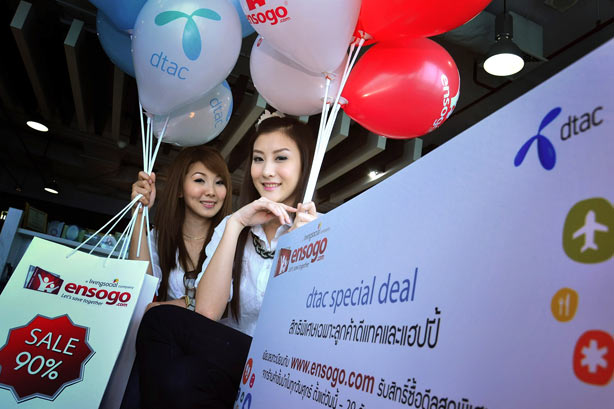As discount deal websites explode in the region, a Thai company shows how it’s done

Deep-discount deal sites have been surging throughout the United States and Europe for almost three years, but they were late off the starting blocks in Southeast Asia – arriving only in mid 2010.
Since then they have moved and morphed, bought and sold themselves in a rapid game of catch-up.
In June 2010, when Tom Srivorakul and his two younger brothers launched Ensogo, the first deal website in Thailand, they employed five people and had a single offer: a 60% discount at ice cream chain iBerry.
A year later, when Ensogo was bought for an undisclosed sum by LivingSocial, the second-largest US deal company with a monthly revenue of $50m as of the start of this year, the start-up had 430 employees, 17 city sites in Thailand, the Philippines and Indonesia and more than two million subscribers to its daily discount deal e-letter, a number they hope will increase to five million by 2012.
In all three countries, Ensogo has about 20 rival deal sites, also known as coupon sites or voucher sites. Among the Thai competitors are Deal DiDi, Dealicious, S! and NCoupon, owned by The Nation.
Yet, in terms of revenues, Ensogo dominates well over 80% of the Thai market. Typically attracting small and medium-sized businesses, bigger merchants are now signing up in a bid to lure some of the one million Thai and expat subscribers.
“All the brands want to work with us now,” says Tom, 37, the confident, speed-talking managing director, Chief Operating Officer and public face of Ensogo (LivingSocial has not made any changes to management since the acquisition).
Hilton, Centara and Mandarin Oriental hotels and Orient Thai airlines run offers, and purchases with Visa now get an extra 5% discount. With LivingSocial associates in 21 countries, Ensogo can now promote a deal to a larger market.
Because of Ensogo’s edge in Thailand, a greater proportion of the LivingSocial budget is being channelled to marketing in the Philippines and Indonesia. Online, print, radio and billboard ads are popping up, and their presence on Facebook and Foursquare is intensifying.
In Indonesia, Ensogo took over a locally founded site called DealKeren (meaning nice deal), which held 65% of market share, in April. However, this slice narrowed to about 44% after Groupon, which has outposts in 43 countries and 83m subscribers, acquired rival DisDus in April.
Groupon sparked online-deal mania when it launched a daily deal in Chicago in 2008; its revenue for the first half of 2011 came in at nearly $690m.
Ensogo entered the Philippine market in September last year and enjoys 40% market share, but the competition is more fractured. Cash Cash Pinoy, launched in August 2010, and Groupon Beeconomic are key players.
But the smaller survivors aren’t necessarily doomed. High-end ticket deals have pushed up Ensogo and Groupon’s revenues, yet smaller rivals have more than 100,000 subscribers, and they will benefit from the newest deal hitting Southeast Asian shores: aggregated deal sites that pull together the offerings of all local deal sites into a single place.
Dealshelve is the go-to aggregate site in Malaysia, Singapore and the Philippines, and Wecombi is the market leader in Thailand.
It’s big business. Roughly every day Thai sites offer 20 deals, which last for up to three days. In Indonesia, it’s closer to 100. Each deal promises the buyer 50% to 80% off the normal price for a service or product. In the United States, a typical discount voucher on Groupon, LivingSocial, Travelzoo, Glitz or any of the other sites might sell for $50
to $100.
On Ensogo, a voucher might go for as little as 50 baht ($1.60), which would work out as a 50% discount on a 100 baht item at Chiang Mai’s Grandma’s Bakery, for example. Most deals are related to services and are bought by women. Though, unusually, DealKaren also has deals on USB drives, iPhones and other products at
particular stores.
Customers can pay for the vouchers by credit card, bank transfer or cash at Ensogo offices. While Thai customers can also buy at the 6,000-plus 7-11s, most pay by credit card, encouraged by the Visa 5% discount deal.
Ensogo splits revenues equally with the merchant, who benefits from free advertising regardless of whether the customer turns up.
“For the merchant it’s the greatest thing since sliced bread. They think: ‘We’re exposed for free,’” Tom says. His confidence doesn’t just stem from the rollout and sale of Ensogo. Ensogo is his and his brothers’ second big digital success, having founded a digital ad agency and the ad-buying network Admax.
Although Ensogo was courted by Groupon for months, Tom says, LivingSocial was ultimately chosen because, partly owned by Amazon, it offered more and better technology upgrades.
That doesn’t mean his market base will soon be seeing the cutting-edge technology available in developed countries such as applications that find the nearest deal in, say, a spa or an Imax theatre.
Smartphone connections tend to be better in the Philippines and Indonesia than in Thailand, but it’s still not advisable to attempt a bank transfer or credit card payment over them.
Instead, Ensogo’s short-term goal is to expand its subscriber base and to provide more customised offers.
“I think relevance is huge to a consumer nowadays,” Tom says. “The next six months is crucial. We have to wow our customers. We want to be the place for concerts, cabarets, entertainment and last-minute tickets.
It will be very orchestrated.”

